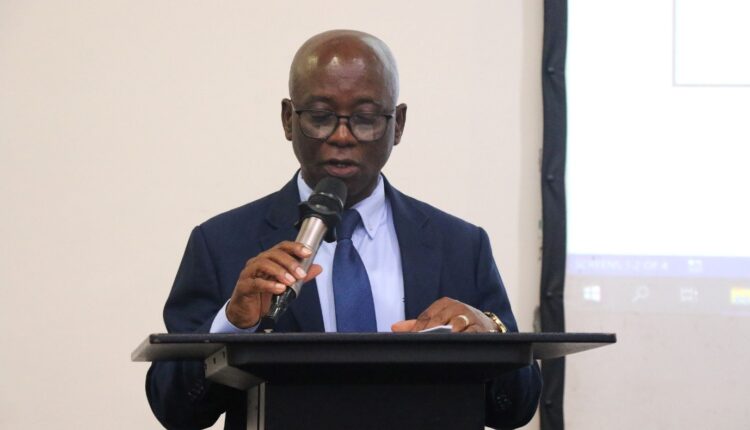The Ministry of Health has organised a 3-day orientation and capacity-building workshop for board members and heads of its agencies, aimed at equipping leaders with the skills and competencies required to drive efficiency and accountability across the health sector.
The workshop, officially launched by the Chief Director of the Ministry, Mr Desmond Boateng, on behalf of the Health Minister, Hon. Kwabena Mintah Akandoh, is a strategic intervention aimed at strengthening governance and leadership within the sector.
The workshop covered key areas, including corporate governance architecture, ethics, and a code of conduct for public service officials, the scheme of service and performance management, the regularisation of Category A and B office holders, critical public service laws and regulations, and understanding and managing emotional intelligence.
Mr Boateng noted that the programme is designed to sharpen leadership through practical training in corporate governance, strategic planning, financial management, ethical leadership, and health policy analysis.
He emphasised that the success of the programme would be measured by how effectively participants translate their knowledge into outcomes that advance the government’s health priorities, including the rollout of free primary healthcare, the operationalisation of the Ghana Medical Trust Fund, the expansion of cancer and mental health services, and progress toward Universal Health Coverage.
Director of Human Resources, Mr Frederick Mensah Acheampong, also underscored the importance of the initiative, noting that it had been carefully designed to provide participants with the tools, knowledge, and policy frameworks needed to deliver on their responsibilities with confidence and integrity.
The Chief Director stressed that the workshop is not an end but part of a broader commitment to building a resilient and people-centred health sector through empowered, accountable, and visionary leadership.
Strengthen Healthcare Resilience
In related development, the Ministry has commended District Directors of Health Service( DDHS) and urged them to brace themselves against any vulnerabilities in healthcare delivery as the country works towards achieving Universal Health Coverage (UHC) by 2030.
The Chief Director, Desmond Boateng, who delivered a keynote address on behalf of the Minister for Health, Kwabena Mintah Akandoh, at the 32nd annual general conference of the District Directors of Health Service Group (DDHS-G) held in Kumasi from September 9 to 12, said the resilience of Ghana’s healthcare system depends largely on the commitment of health leaders at the district level.
This year’s meeting was held under the theme: “Enhancing Health Security in Ghana: Innovations, Preparedness, and Workforce Well-being for a Sustainable Future.”
Mr. Boateng noted that health security goes beyond responding to disease outbreaks, stressing that it involves building strong and resilient systems capable of anticipating, preventing, and effectively responding to both communicable and non-communicable threats.
Citing lessons from the COVID-19 pandemic, he emphasised the importance of preparedness and innovation in safeguarding the health of citizens. He described the establishment of the Ghana Vaccine Institute as a significant step towards self-reliance, ensuring that the country can reduce dependence on external supply chains during future pandemics.
“At a time when global support is receding, Ghana has chosen not to shrink but to innovate, filling funding gaps and preventing reversals in health gains,” he added, highlighting the government’s commitment to meeting counterpart funding obligations to GAVI.
Touching on emerging threats, Mr. Boateng referenced recent cases of Mpox, warning that zoonotic and re-emerging infections remain a “clear and present danger.” He disclosed that the government, in collaboration with the Ghana Health Service, is scaling up surveillance, procuring vaccines, and intensifying risk communication to minimise spread.
He also pointed to the growing burden of non-communicable diseases such as hypertension, diabetes, and cancers. He argued that the Free Primary Health Care (PHC) initiative will be pivotal in promoting early detection, lifestyle modification, and reducing complications that drive up household healthcare costs.
“The Free PHC policy complements the Ghana Medical Trust Fund (Mahama Cares). Together, they create a continuum, prevention at the base, financial protection at the apex, ensuring both sustainability and universality,” he explained.
On workforce development, he disclosed that since January 2025, government has recruited 13,500 nurses onto payroll and is considering a vehicle revolving fund initiative for health staff, with District Directors to be prioritized.
He further underscored the importance of the Community-Based Health Planning and Services (CHPS) programme, revealing that District Assemblies have been directed to construct at least two CHPS compounds annually, with a focus on completing abandoned projects to bridge rural, urban access gaps.
Mr. Boateng reiterated that all these interventions, emergency preparedness, sustainable financing, preventive healthcare, workforce support, and CHPS expansion, are aligned with Ghana’s goal of achieving UHC by 2030.
“Health systems are judged not by their rhetoric but by their outcomes. Let us therefore commit to building one that is clinically effective, financially sustainable, and socially just,” he charged.


Comments are closed.